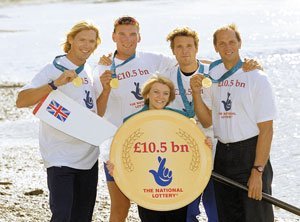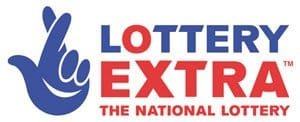
Most UK citizens are familiar with the National Lottery and its potential for making millionaires of people who manage to select the ‘winning’ 6 numbers out of the 49 available, at odds of around 14 million to 1. Of course, many people win the smaller prizes; each week there are usually more than 1 million winners from among the 29 million participants.
The National Lottery was launched on 14 November 1994, with the first live draw five days later. Under the Act of Parliament that set it up, the National Lottery is operated under licence by a private sector company. The original 7 year licence to operate the Lottery was awarded to the Camelot Group plc. It then succeeded in winning the licence for a further 7 years in December 2000, granted by the National Lottery Commission.
Under the terms of its licence, Camelot is required to operate the National Lottery in an efficient and socially responsible way, protecting both players and the integrity of the lottery, and to ensure that it generates the maximum amount of money for the Good Causes which are designated by Parliament.
Camelot does not determine which charities and Good Causes receive the revenue it raises. These are The Community Fund, The Millennium Commission, The Sports Councils, The Heritage Lottery Fund, The Arts Councils and New Opportunities Fund. Every week, Camelot passes the money for the six Good Causes, to the National Lottery Distribution Fund, which allocates funds to the 15 distributing bodies. These bodies assess applications and decide what awards should be granted. Nor does Camelot have ‘a free hand’ in running the lottery. The company is answerable to the National Lottery Commission, which acts as regulator.
Most other developed countries have had a national lottery for many years, so the UK National Lottery is a comparative latecomer. Ever since it began, it has had to compete for players with a range of established national gaming activities such as football pools, bingo and horse race betting. However, because of its association with very big prizes and also with raising money for the Good Causes, it quickly captured the public imagination.
Unique place in the market
Research shows that around 60% of the UK’s adult population take part in the National Lottery at least once a month. Of the people who buy National Lottery tickets, 70% do not currently participate in other forms of gaming. This suggests that the National Lottery has a unique place in the market; it is a clear, distinct product. However, it does not have a captive market. People can choose not to participate, and, like any other product, the Lottery faces the challenge of changing consumer tastes, and needs to be ‘refreshed’ and given a new look from time to time. There are many beneficiaries of the National Lottery, including:
- the various prize winners, who share 50% of the total revenue raised
- the Good Causes, which receive around 28%
- the government, which takes around 13% in tax revenues
- 35,000 retailers who sell the tickets and keep 5% of revenues as commission
- Camelot’s shareholders (five companies, each with a 20% stake who take around 1% in profit – reducing to 0.5% in January 2002).
As at 1 October 2001, the National Lottery had generated over £10.5 billion for Good Causes, and more than £4 billion for Treasury funds. It had also created 1,222 millionaires. Since its inception, participating retailers have received more than £1.7 billion in commission. For many small retail outlets, this income (averaging £7,700 each per year) has been the difference between survival and ‘going under’ in the face of intense retail competition. Clearly, the National Lottery is ‘big business’. There remains the thorny question of just how far, and in what aspects of its operation, it needs to be regulated by government. This case study considers that question.
The nature of regulation

Over the past thirty years, UK governments have come to realise that in order to control an industry they do not need to own it. Successive UK governments have reduced the state’s direct involvement in UK industry. Many industries that were previously owned and run by the state have been privatised eg steel, railways, water, gas and electricity. One major advantage to the government is that, by not owning an industry, it ceases to be directly responsible for the risks that go along with ownership, including raising capital for investment, recruiting labour, finding markets for products, maintaining good industrial relations, keeping consumers happy and taking most of the blame when things go wrong. It came as no surprise, therefore, when the government decided not to run the National Lottery itself.
However, governments are reluctant to set industries entirely free. With the National Lottery, the UK government took steps to ensure that it retained extensive control, with a view to protecting the interests of players. Regulation involves the government setting down rules and then making sure that these rules are observed by appointing a regulator to monitor companies’ activity. Regulation is a means of safeguarding consumers and the vulnerable in particular and ensuring fair competition. Industrial regulation covers many areas, including requiring operating companies to:
- guarantee a minimum level of service to all consumers eg water supply, letter delivery
- seek permission for price increases eg electricity companies, train operators
- observe health and safety regulations eg oil industry, food industry
- submit to regular inspection eg restaurants, abattoirs, nursing homes
- meet set performance standards eg Camelot having to resolve at least 90% of complaints within 10 days – although the company does very much better than that
Not everyone agrees that such regulation is either necessary or desirable. Some argue that, for as long as an industry is competitive, rivalry between the firms within it will safeguard consumers’ interests, because firms will strive to offer the best products at the cheapest prices. By this line of argument, all that a government needs to do is to ensure that companies within an industry remain genuine rivals and that no one firm comes to dominate the market.
In the case of the National Lottery, regulation involves making sure that competitions are managed fairly, honestly and that focus is maintained on raising funds for the Good Causes. The UK has one of the strongest regulatory regimes among all of the world’s lotteries.
Regulating the National Lottery

The National Lottery Commission regulates the operation of the National Lottery. Its statutory duties are to:
- protect the interests of participants
- ensure that the lottery is run and promoted with all due propriety and, subject to these two obligations
- maximise the returns available for Good Causes.
The Commission has strong powers. Amongst those wide-ranging powers it has the right and duty to:
- select the company or organisation to run the lottery, award the licence and revoke it if its integrity is compromised
- determine the number, type and frequency of games that can be offered
- enforce the conditions under which the licence is granted eg no selling tickets on the street or on bookmakers premises and guaranteed anonymity for winners who request it
- carry out compliance audits of any area of lottery operation eg making visits to retailers’ premises to ensure compliance such as no sales to under 16s.
The Commission has a range of remedies available to it, including publicly recording licence breaches, imposing fines, seeking enforcement in the High Court and, in extreme cases, revocation.
Some principles of good regulation

Effective regulation is a fine balancing act between ensuring a climate in which competition and enterprise can flourish, and providing the necessary protection for consumers and the wider community.
When an industry is over regulated, there is less scope for that organisation to be innovative and to pass on the benefits of free competition to the consumer.
The Government’s Better Regulation Task Force has asserted that good regulation and its enforcement should meet the following principles:
- Transparency – regulation being open so everyone can see what is going on.
- Accountability – regulators accepting responsibility for their actions.
- Consistency – regulators treating all organisations and every case in the same or broadly similar way.
Camelot sees itself as part of the gambling industry in general and in competition with all other ways in which people can ‘have a flutter’. Camelot feels that in recent years there has been some lack of consistency in how different parts of the gambling industry are regulated.
Operating in a competitive environment
Camelot has set clear strategic objectives for its second licence period. These include:
- to deliver target returns to Good Causes in a socially responsible way
- to increase the number of players and total sales
- to maximise player and retailer satisfaction through high levels of service
- to retain the trust and support of the general public
- to deliver healthy returns to shareholders.

In order to meet these objectives effectively, Camelot feels that there needs to be more consistency in the regulation of an already highly regulated industry. Camelot believes that there are too many conflicting regulations covering different aspects of gambling eg gaming, betting, bookmaking, pools, bingo and too many lottery specific regulations. The company wishes to see more consistency in the regulation of different forms of gambling. Camelot is particularly concerned about the unequal tax regimes. In recent years the UK government has abolished the tax on bingo and on betting in order to protect the huge UK gambling industry from off-shore operators who escaped UK taxes and could offer more attractive returns. This has allowed UK-based bingo operators and bookmakers to make their own products more attractive.
It seems likely that in the near future the level of regulation for competitors to the National Lottery will be reduced and they will be allowed to offer bigger prizes eg allowing rollovers for bingo with far higher jackpot prizes.
Faced with this increased competition, Camelot sees the regulatory regime in which it operates as a barrier to rapid and flexible response. The company believes that the only way to achieve a more effective balance between its own commercial requirements and the needs of customers is to allow it greater self-regulation. It argues that eight years of experience of operating the National Lottery has demonstrated its willingness and ability to operate safeguards and respect rules; giving it more freedom of action carries very little risk.
Camelot is heavily constrained by over 2000 rules and regulations, some of which it feels are more disabling than enabling. The company feels that the level of external regulation should decrease in order to create a more competitive climate, while still providing all of the necessary safeguards.
Meeting quality standards
International quality standards are awards given to organisations which prove consistently over a period of time that they can guarantee certain levels of performance. Camelot works within a sophisticated quality framework to ensure that it is transparent and accountable and operates to the highest standards of corporate governance and is a UK leading company in the development of theory and practice of corporate social responsibility. This includes: Recognised accreditation for:
- Processes: ISO 9001.
- Employee Investment: Investors in People.
- Security: BS7750.
- A Staff Consultative Forum.
- A community investment strategy including an independent charitable foundation and an employee participation programme.
- A full social and ethical audit of the company.
Conclusion

The issue of whether the National Lottery is over-regulated is open to debate. Some people will argue that any form of activity where there is a possibility for someone to suffer harm or loss should be tightly regulated. However, the argument then is that the regulations should treat everyone in that industry in a similar fashion.
Other people are of the opinion that in a modern market economy it is competition and freedom to respond rapidly that drives efficiency and benefits consumers, and that if an organisation has developed internationally recognised quality standards, then there is less need for heavy handed external regulation.
